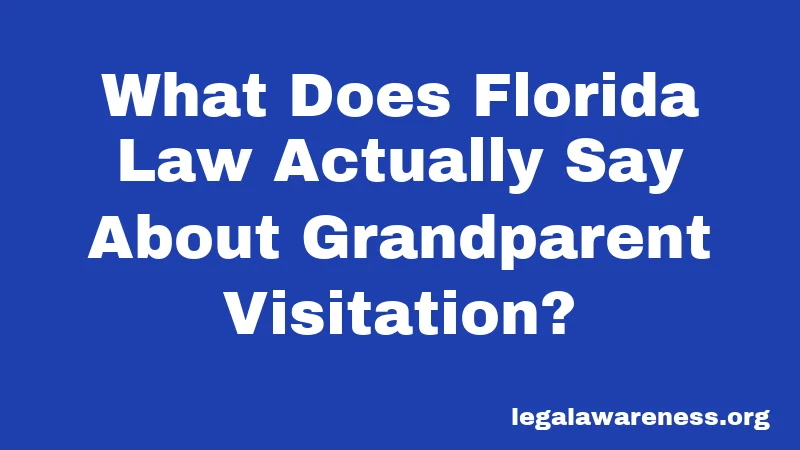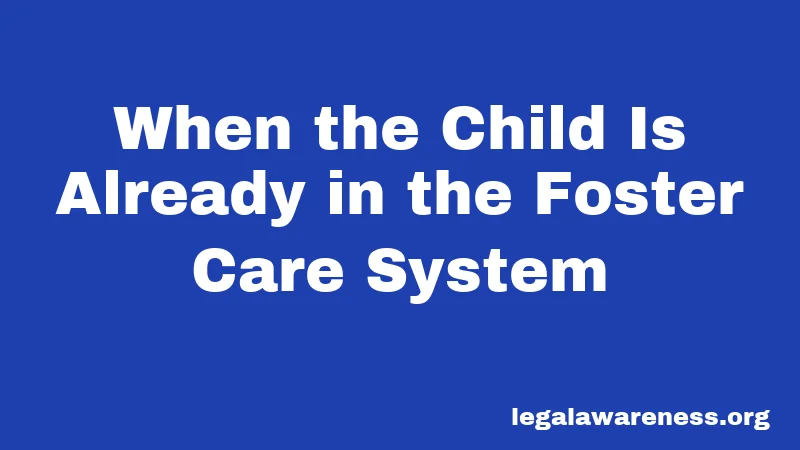Florida Grandparent Visitation Laws in 2026: The Real Rules You Need to Know
Most people think grandparents automatically get to visit their grandchildren in Florida. That’s not quite how it works. Seriously.
In Florida, parents have strong legal rights to decide who sees their kids. Grandparents don’t have an automatic pass. But stay with me here—there are specific situations where a grandparent can go to court and win visitation rights.
Let’s break down exactly what Florida law allows, what it doesn’t, and what you need to do if you’re in this situation.
What Does Florida Law Actually Say About Grandparent Visitation?

Here’s the thing: Florida law takes parental rights very seriously. Parents get to make decisions about their children. They get to decide who visits, who calls, and who spends time with their kids.
That said, Florida recognizes that grandparents matter. A lot. The state has specific laws that allow grandparents to petition the court for visitation under certain circumstances. These laws are in Florida Statute § 752.011 and a few related statutes.
You’re probably wondering: When can a grandparent actually ask the court for visitation rights? Good question. The answer depends on the situation.
When You CAN Ask the Court for Visitation
Florida law allows grandparents to petition for visitation in very specific circumstances. Here’s what those are.
Scenario 1: When One or Both Parents Are Deceased, Missing, or in a Permanent Vegetative State
If both parents have died, a grandparent can ask the court for visitation rights. Same thing if one parent has died. The other parent would need to meet certain conditions, though (we’ll get to that in a second).
Missing counts too. In Florida, a parent is considered “missing” if nobody can find them after a serious search for at least 90 days. The search needs to include calling hospitals, employers, relatives, police, and other agencies.
If a parent is in a persistent vegetative state (meaning they can’t interact with anyone), that also qualifies.
Scenario 2: One Parent Is Dead, Missing, or Vegetative—And the Other Parent Committed a Serious Crime
This one’s important. If one parent is deceased, missing, or in a vegetative state, AND the other parent has been convicted of a felony or crime of violence, a grandparent can petition for visitation.
But here’s the catch: the crime has to show that the parent poses a serious threat to the child’s health or safety. Not all felonies count. The crime needs to be bad enough that the court thinks it shows the parent might harm the child.
Scenario 3: A Parent Killed the Other Parent
Hold on, this part is serious. In 2022, Florida passed what people call the “Markel Act.” It creates a special rule for a tragic situation.
If one parent was found responsible for killing the other parent—either through criminal guilt or a civil court decision—then a grandparent or step-grandparent of the deceased parent automatically gets a strong preference for visitation. The only way the court can say no is if visitation would hurt the child’s best interests.
This law came about after a university professor named Dan Markel was killed in Tallahassee. His parents championed this law to help other families in similar situations.
Scenario 4: The Parents Have a Child Together But the Grandparent Relationship Got Cut Off
Okay, pause. This one’s actually pretty interesting. The original Florida law used to have a rule for this situation. It allowed grandparents to ask for visitation even when both parents were married and living together—if the parents had deliberately cut off the relationship.
But the Florida Supreme Court ruled that part unconstitutional. It said it violated parents’ rights to raise their kids as they see fit.
So while the statute technically mentions this scenario, courts don’t grant visitation in these cases anymore. Sorry—we know that’s frustrating.
When the Child Is Already in the Foster Care System

This is a different area entirely. If a child has been removed from a parent’s custody and the court says the child is a dependent, grandparents have some automatic rights.
Under Florida Statute § 39.509, grandparents (including great-grandparents and step-grandparents) are entitled to reasonable visitation. The Department of Children and Families has to arrange these visits unless there’s a compelling reason not to.
This applies even if one parent dies or their rights are terminated. The visitation can happen in the grandparent’s home and doesn’t always have to be supervised.
What the Court Looks For: The “Best Interest” Standard
Sound complicated? The legal process actually depends on one main thing: what’s best for the child.
When a grandparent files a petition, the court has to look at several factors. These aren’t just suggestions—judges have to consider them seriously.
Here’s what courts think about:
The emotional bond between the grandparent and the child matters. How long have they known each other? Do they have a real relationship? Or was this a distant connection?
The court also looks at whether the grandparent is willing to encourage the child to have a good relationship with the parents. A grandparent can’t come in and try to turn the child against the parent and expect to win visitation.
The child’s mental and physical health is important. So is the grandparent’s health. If the grandparent has serious health issues that would make visitation difficult, that’s a factor.
What about the child’s own preference? If the child is old enough to express a meaningful preference, the court listens. Usually this means the child is around 12 or older, but it depends on the child’s maturity level.
The court also considers whether breaking up the visitation caused real emotional or mental harm to the child. Did the child show signs of depression, anxiety, or behavioral problems after the grandparent disappeared from their life?
Finally, courts look at whether any professionals have evaluated the child. A psychologist’s opinion can carry weight in these cases.
What Happens When You File a Petition

Not sure about the actual legal process? Let me break it down step by step.
First, you file a petition with the court. This is a formal document asking the judge to grant you visitation rights.
The court then schedules a preliminary hearing. This happens fairly quickly, usually within a few weeks.
At that hearing, you have to show the judge that you have what’s called a “prima facie case.” That’s fancy legal language meaning “enough evidence to take this seriously.” You need to show that the parent is unfit OR that the child has been significantly harmed by losing the relationship with you.
Here’s where it gets real: if you don’t make that showing at the preliminary hearing, the judge can dismiss your case right then. And honestly, this dismissal can happen fast.
If the judge thinks you have a valid case, the court will refer you to family mediation. Florida actually encourages families to work this stuff out themselves rather than fight in court. A neutral mediator helps you and the parents talk through things.
If mediation doesn’t work, you move to a final hearing where you present evidence. The judge will hear from both sides, maybe talk to the child, and decide.
The Penalties and Obstacles You’ll Face
Real talk: getting grandparent visitation in Florida is tough. The law stacks the deck in favor of parents, and courts almost always do.
Why? The Florida Supreme Court says parents have a fundamental constitutional right to make decisions about their children. That right is really, really strong. The court basically says: grandparents’ rights come second.
You might hear the term “parental rights” and think it sounds strong. You’re right. Parental rights beat grandparent rights in almost every situation.
So what does this mean practically? If you want to get visitation, you need to be ready for a real fight. You might need a lawyer. You’ll probably need to go to court multiple times. You might need to pay for psychological evaluations or gather witness testimony.
The parent you’re suing can ask the court to make YOU pay their attorney’s fees if your case gets dismissed at the preliminary hearing. That’s a real cost to consider.
And emotionally? Court cases create conflict. Sometimes families end up worse off after going through the legal process, not better.
Special Circumstances to Know About
A few other situations affect grandparent rights in Florida.
What Happens If the Parent Gets Remarried?
Sometimes a parent gets remarried and the new step-parent wants to adopt the child. A lot of grandparents worry this will end their visitation rights.
Actually, Florida law says a step-parent adoption doesn’t automatically end grandparent visitation rights. But the court CAN decide that stopping visitation is in the child’s best interest. So it’s not automatic protection, but the grandparent has a chance to argue for keeping the relationship.
What If the Child Gets Placed for Adoption by Someone Outside the Family?
If a child is adopted by someone who isn’t a family member, grandparent visitation rights generally end. The law doesn’t provide for visitation in those cases, with one exception.
If the child is being adopted by a stepparent or another close relative (which is allowed), then grandparent rights can continue. But outside adoptions are a full stop.
What If the Parent Violates the Visitation Order?
If you have a court order and the parent refuses to let you see the child, you can go back to court. You can ask for enforcement of the order.
But here’s the thing: courts move slowly. By the time you get enforcement, valuable time has passed.
How to Actually Get Visitation: The Real Process
Wondering if this applies to your situation? Let me walk you through what you should do.
Step 1: Talk to the Parents First (If Possible)
Honestly, this is the best approach if there’s any chance it works. Try asking the parents if they’d be willing to work out a visitation schedule together.
Maybe they’ll say yes. Maybe they’ll say no. But it’s worth a conversation before you get lawyers involved.
Step 2: Try Mediation Before Court
Some people in your situation might benefit from family mediation. This is less expensive and less adversarial than court.
In mediation, you sit down with a neutral third person who helps you and the parents communicate. Sometimes people can figure out a compromise in mediation.
If mediation works, great—you have an agreement. If it doesn’t work, you haven’t lost anything except a little time.
Step 3: Consult With a Family Law Attorney
If the parents won’t work with you and mediation isn’t happening, you need a lawyer. Seriously.
This isn’t something you can easily do on your own. A family law attorney can tell you honestly whether you have a realistic chance of winning. They can also explain what the process will cost and how long it might take.
Find an attorney in your county who specializes in family law and grandparent rights specifically. This matters because they know the judges and how they handle these cases.
Step 4: File Your Petition
Your attorney will file the petition. It will include all the details about your situation and why visitation is in the child’s best interest.
Make sure everything in the petition is factual and well-documented. Include dates, specific examples, and evidence of your relationship with the child.
Step 5: Show Up for the Preliminary Hearing
This is crucial. You need to convince the judge you have enough of a case to move forward. Prepare thoroughly. Bring any evidence that shows your relationship with the child and any harm the child suffered from losing contact with you.
Step 6: Go Through Mediation if the Case Continues
If the preliminary hearing goes your way, Florida law says you have to try mediation. Take it seriously. This is your chance to resolve things without a full trial.
Frequently Asked Questions
Can grandparents get custody instead of just visitation?
It’s possible, but it’s even harder than getting visitation. You’d have to show the parent is unfit and that giving custody to you is in the child’s best interest. Courts strongly prefer parents to have custody. You’d need serious evidence of abuse, neglect, or unfitness.
How much visitation time would I get if I win?
That depends on your specific situation. Florida law says “reasonable visitation.” One grandparent might get every other weekend. Another might get summer vacation time. The judge decides based on what’s best for the child.
What if I’m a great-grandparent?
Florida law includes great-grandparents in the definition of “grandparent.” So yes, you can petition for visitation using the same rules.
What if I’m a step-grandparent?
Step-grandparents have the same rights as biological grandparents in Florida. You can petition for visitation if you meet the legal requirements.
How much does a grandparent visitation case cost?
It varies. If you hire an attorney and go through the full court process, expect to spend $2,000-$5,000 or more. Mediation costs less, usually a few hundred dollars. But these are just estimates—your actual costs depend on your situation.
Final Thoughts
So here’s the bottom line: Grandparents in Florida don’t have automatic visitation rights. Florida law strongly protects parental rights.
But if you meet very specific circumstances—parents are deceased, missing, or unfit—you can ask the court for visitation. The court will consider whether it’s in the child’s best interest.
It’s not easy. Court fights are expensive and emotional. Many cases don’t succeed.
But some do. If you have a genuine relationship with your grandchild and the parents are preventing contact, you might have options.
Talk to a family law attorney who knows grandparent rights. Be honest about your situation. Find out what your real chances are.
And remember: sometimes the best outcome is working things out with the parents directly, without involving the court. That’s almost always faster, cheaper, and better for the whole family.
Now you know the basics. Stay informed, stay safe, and when in doubt, talk to a lawyer.
References
Florida Statute § 752.011 – Petition for Grandparent Visitation
Florida Statute § 39.509 – Grandparents Rights in Dependency Cases
Florida Statute § 752.015 – Mediation of Visitation Disputes
Florida Bar – Information on Grandparent Visitation Laws
DeSantis Signs Grandparents Rights Measure – The Florida Bar (2022)
Florida Courts – Chapter 752 Grandparental Visitation Rights
